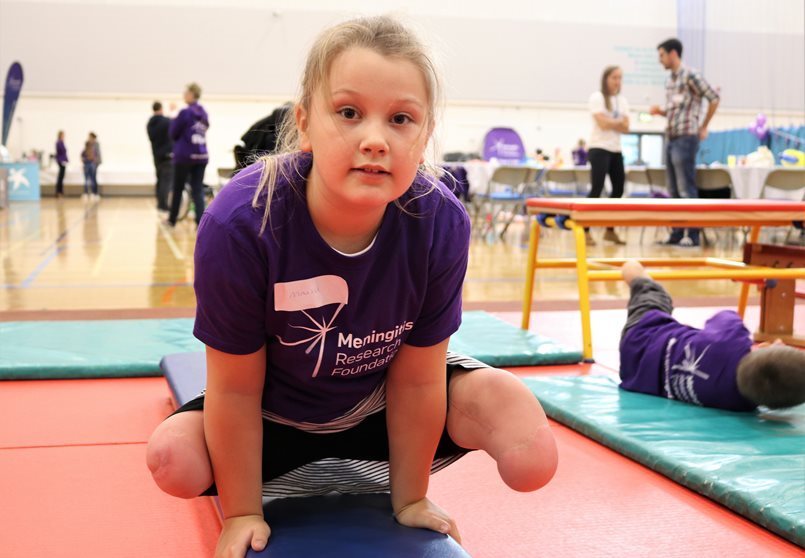Having invested over £19 million funding vital scientific research since 1989, we take a look back at some of our research highlights over the past 30 years; from supporting the development of life saving vaccines, to helping transform the way that Doctor’s diagnose and treat meningitis and sepsis.
Research is a vital part of our mission to defeat meningitis, and it is thanks to the support of our dedicated members and supporters that we can continue to fund ground breaking projects that address some of the most important issues faced in the field of meningitis and septicaemia today.
Here’s a few of the questions our research has helped answer over the years, as well as a few we’re still working on now…
What are the early symptoms of sepsis?
Raising awareness of the signs and symptoms of meningitis is a critical part of our role. It was in fact MRF funded research that first identified the red flag early symptoms of meningococcal sepsis as being cold hands and feet, limb pain and pale or mottled skin.
Is meningitis genetic?
Investigating whether our genetics play a part in meningitis is a key research question. That’s why we have supported research into this area since 1995. Using DNA samples provided from our members and supporters, researchers have identified genes which appear to influence someone’s risk of getting meningitis and/or septicaemia, and genes which determine how severe the outcome could be. In the future this may help explain why only a small proportion of people are affected by the disease.

Is there a link between meningitis and climate?
The meningitis belt of Sub-Saharan Africa has experienced devastating epidemics of meningococcal meningitis for over a century. In the early 2000’s research suggested that it could be possible to make predictions about the location and scale of meningitis epidemics using environmental models. With further refining, these models could reveal which areas should be prioritised for vaccination. Click here to learn more about meningitis and climate change.
Can practices and behaviours put us at increased risk?
In sub-Saharan Africa, cooking in kitchens with firewood stoves was found to be one of the main avoidable risk factors. Over 10 years later, further research in this setting revealed an awareness of this risk – with many families agreeing it would be possible to prevent children from being exposed to kitchen fire smoke.
What is the outcome for meningitis survivors?
We are continually amazed by the strength and remarkable dedication of those affected by meningitis. This was confirmed by research that highlighted the extraordinary resilience, resourcefulness and determination of young people who have undergone amputations due to severe meningococcal disease. Importantly, these findings continue to be used by health professionals to inform treatment decisions and emphasise the importance of follow up care.

Can we track meningitis?
MRF-Meningococcal Genome Library’1 commissioned in 2011 had its finest hour almost immediately, revealing a steep rise in MenW cases in England and Wales was driven by a particularly deadly strain of bacteria, originating from South America. This discovery led to the routine introduction of MenACWY vaccination for teenagers in the UK; stopping this deadly disease in its tracks.
Would the UK government fund a GBS vaccine?
In 2017 a team of expert modellers revealed that a future GBS vaccine would be cost effective2 for the NHS to use in pregnant women. UK decision makers can only recommend vaccines that are cost effective, so undertaking this vital work before a GBS vaccine is licensed means that once a vaccine is ready, the UK will be more prepared to launch a live saving immunisation programme, to protect women and their newborn babies against GBS.
Is a more broadly protective, affordable pneumococcal vaccine possible?
While pneumococcal vaccines have had a profound impact, globally, pneumococcal disease remains a major killer, especially among children. Affordable vaccines which offer widespread protection are therefore urgently needed. That’s why we are proud to have supported the discovery of numerous pneumococcal vaccine candidates; some of which are still being pursued today.

Can we improve recognition of meningitis in babies?
After MRF funded research discovered delays and variability in the treatment of bacterial meningitis in babies, a teaching package was developed to improve recognition and management, with great results; after completing the online e-tool, one Doctor commented that ‘even an experienced paediatrician will learn something new.'
Can we diagnose meningitis more quickly?
Currently a lumbar puncture (LP) is the only way to definitively diagnose meningitis, so the quicker an LP is done, the quicker a patient can be appropriately treated. Yet recent research found that it was typically taking up to 17 hours for an LP to be performed in patients with suspected meningitis. These alarming findings have led to a national audit to try and speed up care for patients. What’s more, samples collected from this study are now being used to validate a rapid diagnostic blood test that aims to quickly distinguish bacterial and viral meningitis.
With your support, we'll be able to continue funding life saving research projects like these, and defeat meningitis wherever it exists.
1 ‘Genomics’
A genome contains an organism’s complete set of DNA. Each strand of DNA consists of 4 chemical bases: A, T, C, G. The order of these bases is unique for each type of meningococcal bacteria, we sometimes call this a ‘genetic blue print’. Whole genome sequencing is a revolutionary technology that quickly works out the exact order (sequence) of the DNA bases. Knowing this can tell us critical information about the bug, including whether or not it is resistant to antibiotics.
2 ‘Cost effectiveness’
Cost-effectiveness analysis compares the costs of an intervention (such as a vaccination programme) with the health benefits (such as lives saved or disabilities prevented). This information helps policy makers decide how we can buy the most health with limited NHS resources.